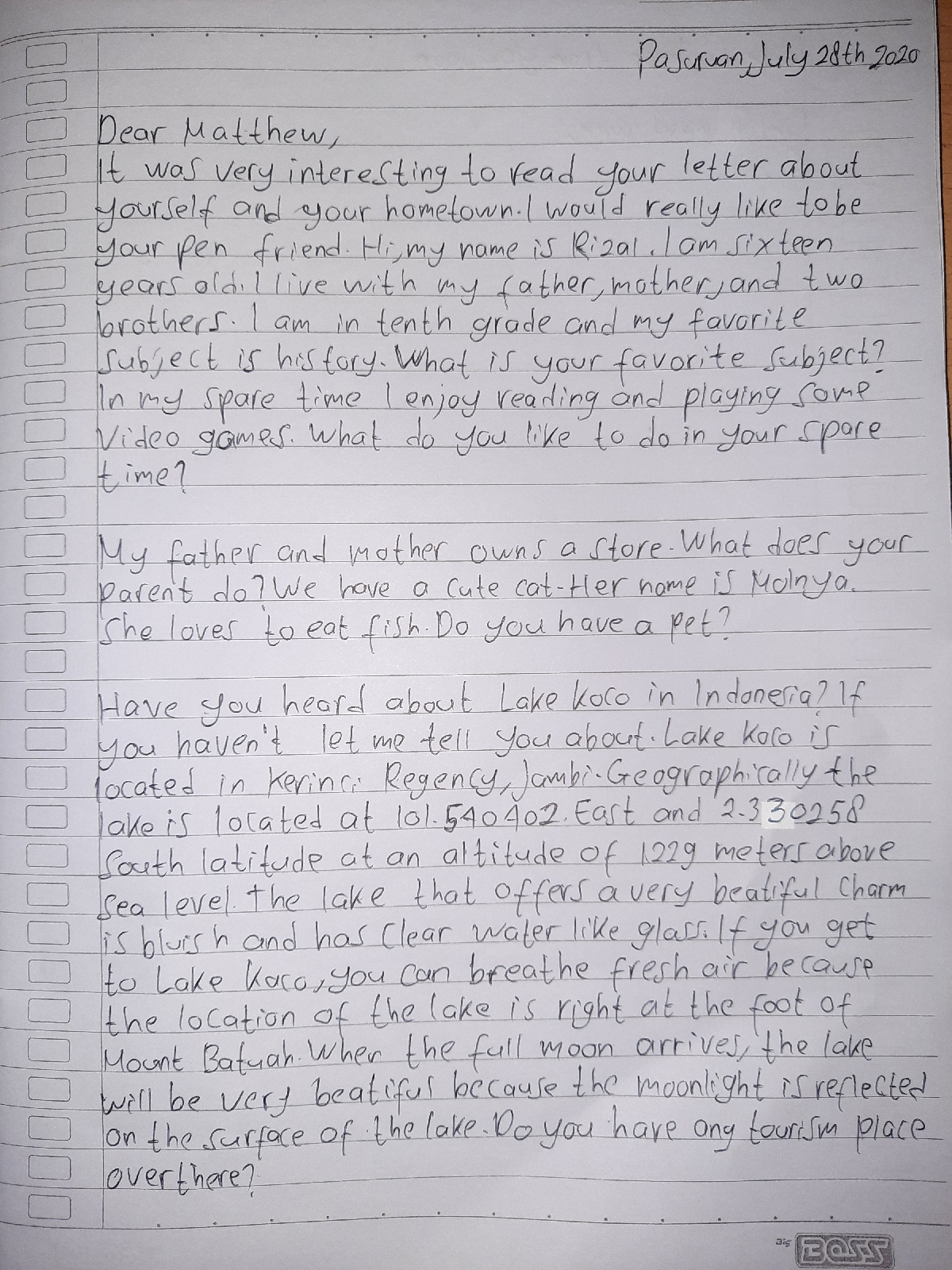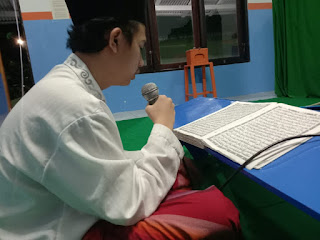Past Perfect Tense
A.Pengertian Past Perfect Tense
Past perfect tense adalah suatu bentuk kata kerja yang digunakan untuk menyatakan bahwa suatu aksi telah selesai pada suatu titik di masa lalu sebelum aksi lainnya terjadi.
B.Contoh kalimat
1. Sinta had studied English before she came to my house. (Sinta sudah belajar Bahasa Inggris sebelum dia datang ke rumahku).
2. My brother did not have an ID card because he had lost it together with his wallet. (Kakak laki-lakiku tidak mempunyai sebuah kartu identitas karena dia telah kehilangannya bersama dengan dompetnya).
3. I had never seen such an amazing beach before I went to Kuta Beach in Bali. (Aku belum pernah melihat sebuah pantai yang menakjubkan sebelum Aku pergi ke pantai Kuta di Bali).
4. Did Dina knew every edges of Jakarta so well because she had never visited the city? (Apakah Dina tahu setiap jengkal Jakarta dengan baik karena dia belum pernah mengunjungi kota tersebut?).
5. I didn’t know who he was. I had never seen him before. (Aku tidak tahu siapa dia. Aku belum pernah melihat dia sebelumnya).
C.Rumus
| Rumus Past Perfect Tense | Contoh Past Perfect Tense |
|---|
kalimat positif (+):
S + had + past participle (V-3)
| My brother had slept |
| They had come |
kalimat negatif (-):
S + had + not + past participle (V-3)
| My brother hadn’t slept |
| They hadn’t come |
kalimat interogatif (?):
had + S + past participle (V-3)
| Had my brother slept |
| Had they come |
D.Contoh soal
1. I was sleeping when somebody knocked the door.
Jawaban dan Pembahasan
- A. I was slept when somebody knocked the door.
- B. I had slept when somebody knocked the door.
- C. I have slept when somebody knocked the door.
- A. I had not work when Shanti came.
- B. I had not worked when Shanti come.
- C. I had not worked when Shanti came.
- A. Had Budi Live in Bali?
- B. Had Budi lived in Bali?
- C. Is Budi living in Bali?
- A. Hadn’t my father eaten before I worked?
- B. Hadn’t my father ate before I worked?
- C. Had my father not eat before I worked?
- A. The mechanic had repaired my car.
- B. The mechanic had repair my car.
- C. The mechanic has been repairing my car.
- A. All students had study before their teacher given a quiz.
- B. All students had studied before their teacher give a quiz.
- C. All students had studied before their teacher gave a quiz.
- A. My father had not came when my mother go to the market.
- B. My father had not come when my mother went to the market.
- C. My father had not came when my mother went to the market.
- A. Tria had taken a bath after she played basketball.
- B. Tria took a bath after she had played basketball.
- C. Tria take a bath after she play basketball.
- A. I meet Budi after I had attended a party.
- B. I had met Budi after I attended a party.
- C. I met Budi after I had attended a party.
- A. Had Dina not read that book when I borrowed?
- B. Had Dina not readed that book when I borrowed?
- C. Had Dina not readed that book when I borrow?
Jawaban dan Pembahasan
| No | Jawaban | Penjelasan |
|---|---|---|
| 1 | B | Rumus yang digunakan untuk past perfect tense bentuk positif adalah S + Had + Verb3. |
| 2 | C | Untuk past perfect tense bentuk negative, gunakan rumus S + Had not + Verb3 atau S + Hadn’t + Verb3. Come diubah menjadi verb2, maka menjadi came. |
| 3 | B | Bentuk interogatif, maka rumus yang digunakan adalah Had + S + Verb3 (Past participle). |
| 4 | A | Bentuk negative interogatif, rumus yang digunakan dalam bentuk ini adalah Had + S + Not + Verb3 atau Hadn’t + S + Verb3. |
| 5 | A | Bentuk positif, rumus yang digunakan adalah S + Had + Verb3. |
| 6 | C | Dalam past perfect tense bentuk positif rumus yang digunakan adalah S + Had + Verb3. Sedangkan untuk give menggunakan bentuk kedua (verb2) maka menjadi gave. |
| 7 | B | Rumus yang digunakan adalah S + Had not + Verb3 atau S + Hadn’t + Verb3 (bentuk negative). Verb2 dari go adalah went. Sedangkan verb3 dari come adalah come, came adalah bentuk kedua. |
| 8 | B | Tentukan terlebih dahulu mana kejadian/aktifitas yang terjadi lebih dahulu, mandi atau bermain basket? Kejadian /aktifitas yang terjadi terlebih dahulu itulah yang menggunakan rumus S + Had + Verb3. |
| 9 | C | Seperti yang telah dijelaskan pada soal nomor 8 bahwa Kejadian /aktifitas yang terjadi terlebih dahulu itulah yang menggunakan rumus S + Had + Verb3. |
| 10 | A | Rumus yang digunakan adalah Had + S + Not + Verb3 atau Hadn’t + S + Verb3. Verb3 dari read adalah read. Verb2 dari borrow adalah borrowed. |
Source:



Komentar
Posting Komentar